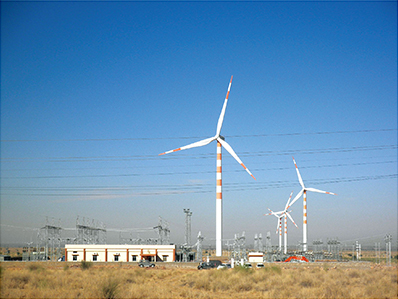(9) Securing Access to Resources and Energy
The number of people without access to electricity is estimated at approximately 733 million in the world and more than 48% of the population in Sub-Saharan Africa as of 2020. Note 83 The lack of electricity, gas, and other energy supplies also leads to many issues, such as delays in industrial development, loss of employment opportunities, and a further increase in the poverty rate. The global energy demand is expected to increase further in Asia and other parts of emerging and developing countries. Meanwhile, energy prices have soared due to factors such as Russia’s aggression against Ukraine, and unseasonable weather worldwide. Under such circumstances, it is important to ensure energy security through diversification of energy suppliers and energy sources.
● Japan’s Efforts

A wind power plant built in India under the “New and Renewable Energy Development Project”
Japan works on the provision of support that enables modern energy supply and stable supply of electricity for industrial development, in order to promote sustainable development in developing countries. In addition, Japan provides support for the establishment of environmentally friendly infrastructure (socio-economic infrastructure), such as energy-saving equipment and power generation facilities that utilize renewable energies (hydropower, solar photovoltaics, solar thermal, wind power, geothermal power, etc.) (see also “Master Techniques from Japan to the World 1” and “Project Introduction Column”).
For example, in the Pacific Island countries located across expansive ocean areas with vulnerability to the influence of climate change, Japan assists in mainstreaming grid-connected type renewable energy from the perspective of energy security and the realization of low-carbon or decarbonized societies. In the Dominican Republic, which highly relies on imported fossil fuels for its electricity supply, Japan supports LED light use for streetlights on public roads across the country through yen loans in order to help improve the energy efficiency of the country. These efforts are expected to contribute to promoting energy conservation and reducing greenhouse gas emissions in the public sector of the country.
At TICAD 8, Note 84 held in August 2022, the Green Growth Initiative with Africa (GGA) was launched with the aim of maximizing Japan’s cooperation through three concepts, namely ownership and co-creation, flexible finance mobilization, and collaboration with diverse partners. As part of the contribution based on GGA, Japan announced its support for private investment in renewable energy projects, expansion of geothermal power generation, and cooperation in the field of mineral resources such as copper and rare metals that were indispensable for achieving a decarbonized society. As support for African countries to appropriately preserve and utilize natural resources and ecosystems, and to realize sustainable growth (green growth), Japan helps in the operation and maintenance of the Africa Power Pool (interconnected power grid among several countries), power distribution networks, and grid stabilization, among other efforts.
In Kenya, through the support to develop the Olkaria Geothermal Power Plants, Japan contributes to increasing and stabilizing power supply, and Japanese companies are responsible for part of the project implementation. In 2022, the ceremony for the official commissioning of the Olkaria I Additional Unit 6 and V Geothermal Power Plant was held. With the inauguration of the plants, Kenya has become sixth in the world in terms of installed capacity of geothermal power.
Japan also supports the “Extractive Industries Transparency Initiative (EITI),” which is a multinational cooperative framework to enhance the transparency of the flow of funds in the development of oil, gas, mineral, and other resources. Under this framework, extracting companies report the amount of payment to the governments of resource-producing countries, and these governments also report the amount of the revenue received from extracting companies to the EITI. In addition to 55 resource-producing countries and many supporting countries including Japan, civil society including extracting companies and NGOs participate in the EITI. They work to ensure transparency of the flow of funds in order to prevent corruption and conflict, as well as to encourage responsible development that leads to growth and poverty reduction.
- Note 83: IEA “Tracking SDG7: The Energy Progress Report,” p. 25.
(https://iea.blob.core.windows.net/assets/8b276fc2-c1ae-4a54-9681-eea1eb143d7f/TrackingSDG7TheEnergyProgressReport2022.pdf) - Note 84: See “ODA Topics.”
